Everything You Need to Know Before Buying a Used Gun

Perhaps the only thing more complex than buying a used gun is buying a used car. Just like you don’t want to get stuck with a lemon for your daily driver, you don’t want a lemon of a firearm.
With so many makes and models available, adding in factors like price, quality, and direct interactions with sellers can make the process seem daunting. However, there are times when buying used is the best or only option. Whether you're searching for an out-of-production gem or simply looking for a great deal, navigating the resale market is often well worth the effort.
Buying used guns requires a combination of technical know-how, research, negotiation skills, and patience. Firearms are designed to last for decades when properly maintained, but neglect can lead to rust, corrosion, and other issues. With the right approach, you can find a used weapon that will serve you reliably for years to come – just as it did for its previous owner.
In this article, we’ll cover everything you need to know about shopping for and assessing used guns before making a purchase, as well as answer your questions about the process. Let’s get started.
Why Buy a Gun Used?
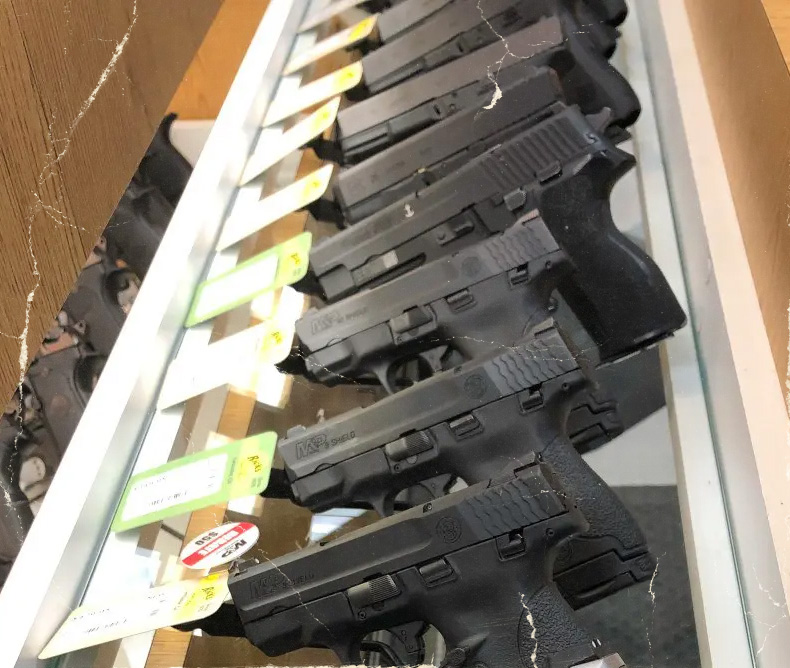
There are numerous reasons to buy a gun on the used market, and there are probably just as many reasons to be wary of these firearms. Buying smart is about understanding both realities and making an informed decision. Let’s cover some of the advantages and disadvantages of buying a used weapon.
Advantages
The biggest and most obvious reason to buy a gun on the used market is to find a sought-after weapon at a discounted price – usually around20% cheaper. A glance at a website or a visit to a gun show will open your eyes to the possibilities. Everything from a Colt Single Action Army to a completely decked-out AR-15 can be found. It’s just a matter of keeping your eyes peeled.
Another major reason people buy used guns is to find firearms that have been discounted by the manufacturer. Whether you’re a collector or just really like a firearm model that is no longer in production, the best and only place to find these weapons is on the used market.
Finally, when buying a used firearm you know you’re buying something that has at least a few to a thousand rounds put down its barrel. The springs and other working mechanisms in the weapon should all be, at least on some level, broken in and tested. You’ll still want to take your new (to you) gun for a spin at the range when you get it, but at least you know it’s been tested over the years.
Disadvantages
Unfortunately, the disadvantages of buying used firearms all come down to the previous owner. People sell their guns for a slew of reasons. Perhaps they need the money, maybe their wife wants them gone, or, sometimes, they may be up to something shady.
There could be an issue with the weapon that they’re trying to hide, they may not be totally interested in selling, or it could be straight-up nefarious. We sincerely hope you never come across this, but a seller could be trying to get rid of a “hot gun” or a broken one. Either way, a good judge of character goes a long way.
There’s also the issue of safety when buying used guns, especially when meeting strangers. Always meet up in a public place, preferably during sunlight hours, and make sure to bring someone with you. Hopefully, you’re dealing with someone who is adamant about selling in a fair and proper way, but you should always be on alert.
Finally, while buying used means the gun has been tried and tested, it also means that someone else has been responsible for its maintenance. If someone took good care of it, great! But there’s also the chance they didn’t keep it up as well as they should have, meaning you could be dealing with things like jams, malfunctions, broken parts, or a shorter life expectancy. That’s why a pre-purchase inspection is so critical.
Where to Buy Used Guns
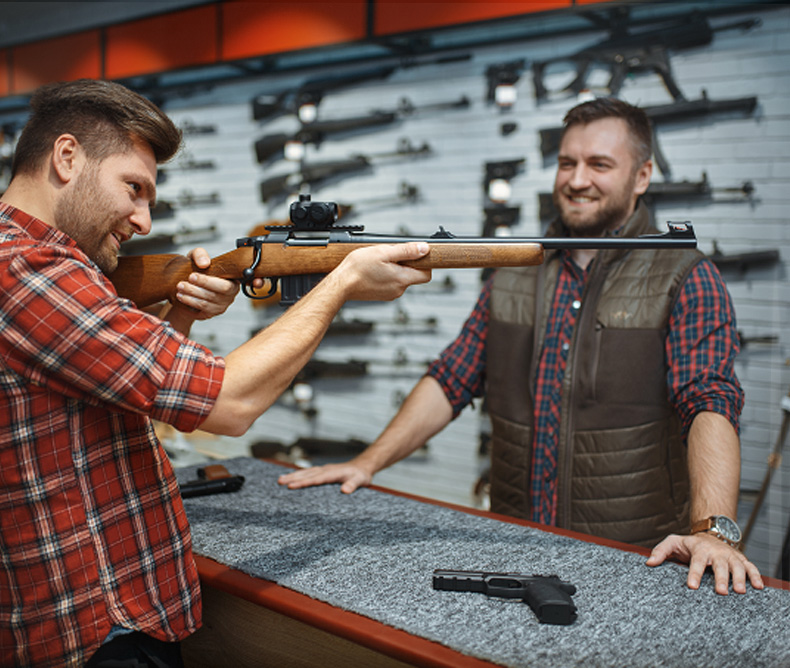
The used firearm market has evolved significantly over the years. Gone are the days when you had to rely solely on local gun shows or pawn shops to explore used options. The internet has revolutionized this space, making it easier than ever to find a great deal right from the comfort of your home.
There are plenty of avenues you can use to find used guns now, each with its advantages and disadvantages. We’ll break down the pros and cons of each in this section.
Online
The latest addition to the used gun marketplace, the World Wide Web hosts countless forums and marketplaces all dedicated to the buying and selling of used weapons.
Here are just a few to get you started:
Though you may have to pick up your gun from a Federal Firearms License (FFL) carrier, online stores offer the greatest selection of used firearms and are more likely to have the rarer, more sought-after models than anywhere else.
Unfortunately, you will only have pictures and descriptions to go off of with this shopping avenue, but a quick glance at seller reviews can give you a good idea about whether a seller is trustworthy. Everyone leaves a review these days, and you may as well use them to your benefit!
Private Sellers
You never know. Your next-door neighbor may be looking to sell his Marlin Model 1984 Repeating rifle, and it is just a matter of sparking up a conversation to be the first bidder.
Though there is an assortment of outlets for local buyers and sellers, private transactions make up a nice portion of how used guns are bought and sold. It is often a matter of being a part of the local firearm community, which allows you to figure out who has what and what is up for grabs.
Online forums and marketplaces serve as a great way to connect with local sellers, but you still have to meet up to exchange money for guns. While the prospect of buying a used weapon can be exciting, it’s crucial to stay level-headed and prepared. Assess both the seller and the firearm carefully before jumping into a deal.
Finally, never feel obligated to buy if something is off. You do yourself no justice if you end up confirming your suspicions at the range a few days later. At that point, you're stuck with the gun and without the money.
Gun Show
The American gun show has gone through a lot of changes in the last 20 years. Not only has the internet caused some shifts, but the propagation of the “gun show loophole” has changed some of the public sentiment toward these events.
Instead of a bunch of smaller sellers trying to sell their overstock of used firearms or private owners trying to make a little cash, gun shows have turned into miniature trade shows and events where major sellers can unload. Despite this, you can still find some great options!
If a piece is popular, you’ll most likely find it at a gun show. From decked-out AR-15s to flashy .44 Magnums, there are plenty of used guns to be seen at a show. The best part is that you can walk around and pick them up and get a feel for whether a firearm is what you’re looking for.
Overall, gun shows are a great experience. You get to see a huge selection of used weapons all at once, and it's a great event to network in the local gun community. Plus, they’re downright fun.
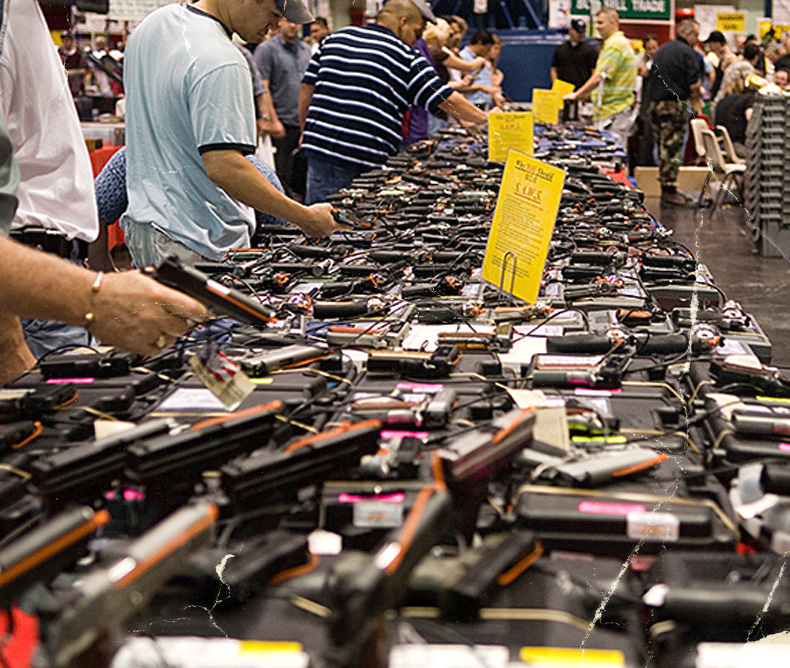
Gun Store/Pawn Shop
If you want expert opinions, a gun store or pawn shop is one of the best places to go. There are many advantages to buying from a reputable establishment. They’ve pre-inspected the guns, are general experts on what they have, and most of all, they’re in the business of selling.
If you’ve dealt with individuals before, you know the threat of potential seller’s remorse. Businesses have to price in a way that keeps the lights on, but the extra money you spend, you make up with a hassle-free interaction.
As well, gun shops and pawn stores have their ear to the ground when it comes to local used firearms for sale. Maybe they couldn’t take a used gun off someone’s hands, but they can point you in the right direction.
Walking into an established business looking for a used gun is easily your best bet. If you’ve got money and you’re itching to spend, you can walk out with a solid, legal firearm the same day.
How Does Used Gun Pricing Work?
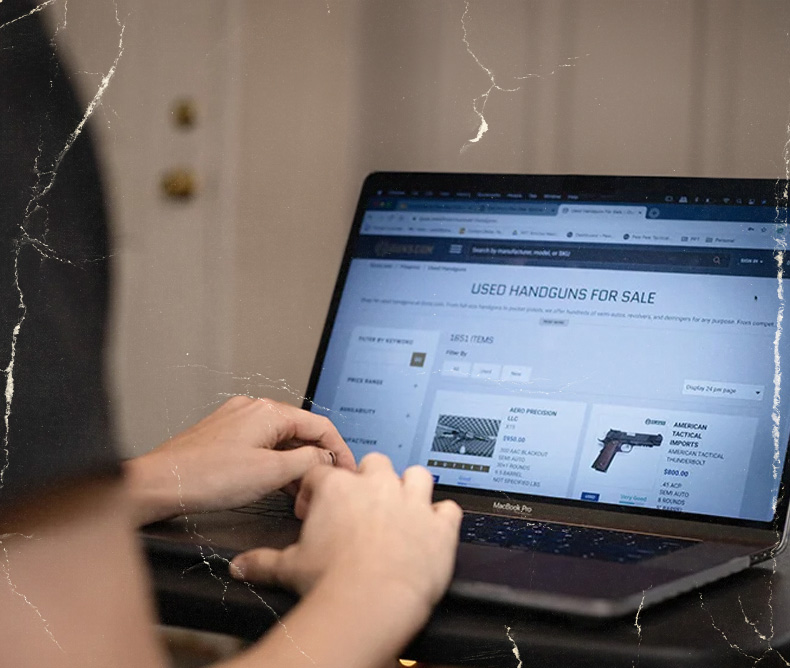
When you start to look at the way used firearms are priced on the market, the wide range of costs can be quite confusing.
On average, you can expect to see used gun prices at around 20% off MSRP, but variables like make, model, age, condition, and popularity can make a huge difference. The best thing you can do is refer to past auctions or sales to get an idea of how much people are willing to buy and sell for. Used guns hold their value pretty well if they are properly maintained, so don’t expect pricing to drop drastically over time.
There are also other resources out there that can be quite helpful when figuring out what you should be willing to pay for something specific. Websites like the Blue Book of Gun Values and Tru Gun Value offer professional help when pricing specific models.
You should also know it’s common to find sellers who offer to throw in ammunition and accessories along with the firearm. After all, they won’t have much use for them once the weapon is out of their hands. If you need these items, great! But, experienced gun owners know not to be blinded by these offers. Many will often throw them in or give major discounts just so they can get all the products off their hands.
How to Inspect a Used Gun: Determining a Good Find
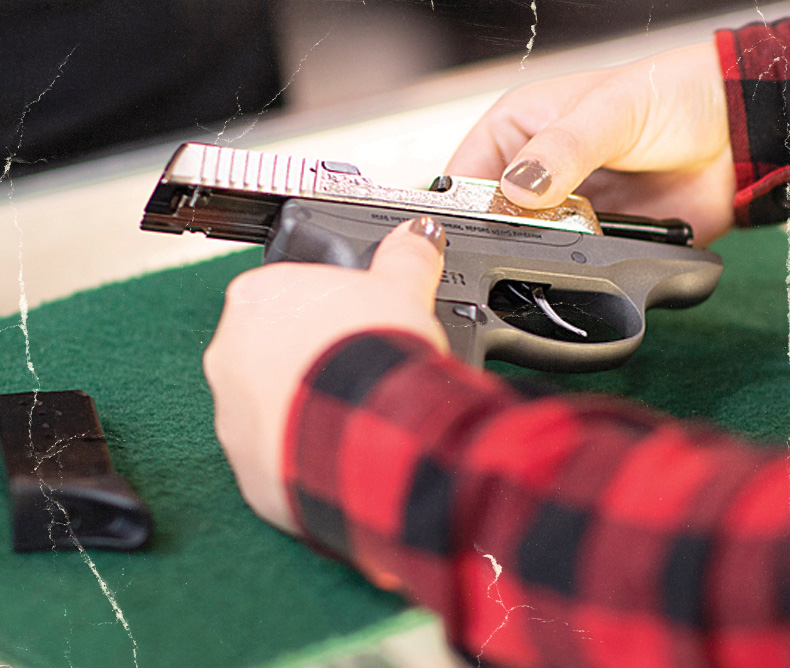
Physically inspecting a used gun can be a daunting task, especially if you’re unfamiliar with the specific make and model. When looking at a prospective buy, you want to walk away with something that will continue to work as intended.
A good way to gauge whether you are spending wisely is to find a few websites and local stores and keep checking for the piece you’re looking for. Do this over a few weeks or months before deciding on a purchase. Essentially the gun buyer's equivalent to window shopping, you can get a great idea of the popularity of a specific model and the fluctuations in pricing.
Once you know for sure what you want, you should do some research to learn more about your future gun, and any common issues to look out for. When it comes time to ask questions or inspect a firearm, you will know what you are talking about and will be able to spot a dud.
These are some major variables to consider before you buy a used gun. But first, remember to always check to make sure the weapon is not loaded before beginning your inspection.
Level of Use
This is the first variable you should figure out before making a purchase. How was the gun used? Just knowing this can majorly clue you in on its value.
For example, many retired law enforcement weapons may have more exterior wear, they usually have minimal interior wear because they are drawn more often than they are fired. These guns are often a fantastic purchase because they’ve typically been well maintained and appreciated, as well as field tested.
On the flip side, a gun that sat in a truck rack for 5 years is most likely not in the best of shape. Though it may have only been fired a couple of times, the firearm sat exposed to many elements that may have degraded the parts and gunked up the inner workings of the weapon.
Long story short, knowing a gun’s history goes a long way in determining whether it has been well-cared for and how much it’s worth.
Major Parts
When handling and inspecting a used weapon, you want to make sure that the functionality of the gun is up to par with something that can continue to be fired safely.
During your inspection, manipulate the action, cycle the chamber, slide the magazine in and out, flip the safety, and decock the levers. If you can do it, you should. Make sure you ask before you dry fire, but do everything you can to make sure that the gun retains all its functionality.
When looking at used revolvers, it is essential to make sure that the cylinder is properly timed. Ensure it is properly aligned with the barrel and the cylinder rotates consistently. Some wear and tear is usual, but a misaligned cylinder could severely damage the gun during future use.
Wear & Tear
Every gun that has been shot will have some element of wear and tear. Even if you clean it after every range day, it will never be as good as new. What you do need to be aware of are major spots of corrosion that could diminish the integrity of the piece.
Minimal rust isn’t terrible (though not great). It could be indicative of the environment or just lacking cleaning, but when that rust turns to pitting, you need to be aware. Pitting is when rust starts to eat away at the metal – essentially slowly destroying the structural strength of the gun.
As stated earlier, minimal wear and tear will be found on just about any used gun, but you need to be informed of when that tear will harm your future usage. Make sure you understand the functionality of your future firearm, so you can discern what is acceptable.
Pre-purchase Questions
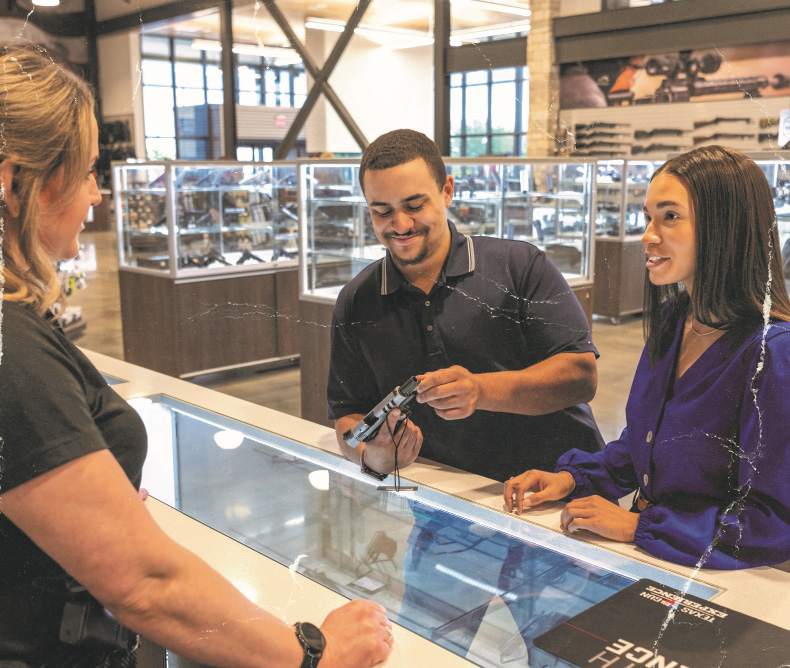
It’s hard to know the best questions to ask when looking into a used gun. Luckily, we put this little list together to cover all your bases. You can download a copy of this checklist here to take with you to the store.
- How many rounds have been fired through it?
- Has the firearm ever been modified from its original configuration?
- Has the gun been cleaned and maintained regularly?
- Can you provide proof of legal ownership (e.g., bill of sale, original receipt)?
- Does the firearm have any known mechanical issues or corrosion?
- Does the firearm come with any accessories (e.g., holster, extra magazines, case, sights)?
- How did you determine the value of the firearm (e.g., market value, appraisal, research)?
- Are you willing to allow a test fire or professional inspection before the sale is finalized?
- Do we need to go through a licensed dealer to transfer ownership? Can you supply a bill of sale?
- Is there anything else I should know about this firearm?
Legal Considerations
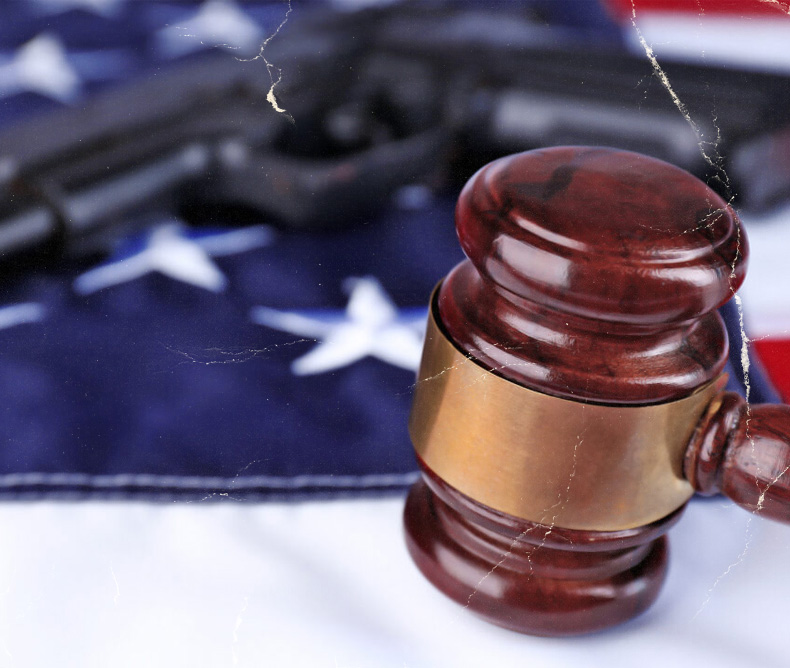
As you know, each state varies drastically in the way they approach the ownership and sale of firearms. For example, in California, private sales of guns – including used ones – must go through a licensed Federal Firearms License (FFL) dealer. This step is required for conducting background checks and maintaining official transaction records in accordance with state laws. On the flip side, Florida is far less restrictive. Private sales between individuals in the state can take place without the involvement of an FFL.
That said, when buying guns online or from out-of-state sources, federal law mandates that the transaction is facilitated by a seller with an FFL. This ensures compliance with background checks and proper documentation.
Another factor you need to consider is the history of a used firearm before purchasing. Only buy from a trustworthy seller. If any inkling tells you that the weapon may have been used in a crime, you need to back out immediately. Having the wrong thing in the wrong place may result in a fine and confiscation, but a “hot gun” could result in more serious consequences.
Another major question people often ask is, if I buy a used gun, do I have to register it? And the answer is that it depends. The U.S. does not have a unified federal gun registry thanks to the Firearms Owners’ Protection Act, which bans the formation of a central database of firearms and owners.
However, state laws regarding gun registration and private sales vary considerably. Some states, like California and New York, do have specific requirements for registering some or all firearms. Other states, on the other hand, don’t. It just depends.
Always check on your local laws before making a used firearm purchase. Never trust a seller to do all the legal legwork – do your own research.
Tips to Happy Gun Buying
As we wrap things up, we hope this has brought some clarity to the often complex world of buying used guns. To leave you well-prepared, remember these key tips so you can make smart, satisfying purchases.
- Buy what you like, not what's popular. Sure, you may have found a new flashy gun at a major discount, but consider whether you will enjoy shooting it for years to come. Just because it seems like “everyone” is talking about a specific model, doesn’t mean it’s the best fit for you.
- Network locally to save money. Genuine friendships often lead to major opportunities. Just as networking can help your career, it can also help you when buying used guns. Knowing people in the market can help you find guns for sale before they actually hit the metaphorical shelf, plus you’ll know it’s coming from a good home.
- Always trust your instincts. If it seems off or too good to be true, my experience is that nine out of 10 times it is. The gun community is usually very friendly and supportive, but just like with any community, it isn’t free of crooks or people looking to make a quick buck.
- Make a list. There are a lot of great guns out there to be had. It’s a lot to keep track of everything being bought and sold, and it can be frustrating waiting around for something to come within your price range. Being open to more than one model of guns can make it easier to find a good weapon at a good price.
- Ask for help or advice. It’s easy to feel on the fence about something. Fortunately, asking for a second opinion often helps you find clarity about what you really want. Someone might bring up something you didn’t consider, sparking a new viewpoint.
Summary
In summary, buying a used gun can be a rewarding experience if approached with caution and knowledge. By thoroughly researching models, understanding pricing, and carefully inspecting the firearm, you can find a quality piece at a great price.
Trustworthy sellers, attention to legal considerations, and a willingness to walk away from questionable deals are key to success. Stay patient, network with the local gun community, and always follow your instincts to ensure a satisfying and safe purchase.
If you’re looking for a new IWB, OWB, or pocket carry holster, head to our Holsters by Gun Model page for Kydex holsters that are custom-made for your weapon of choice.
Interested in items beyond holsters? Take a look at our Resources Page for links to recommended products like lights, lasers, first aid, maintenance, and more. Or, browse our selection of apparel, gun belts, and accessories. And be sure to visit our sister company, GeoGrit, to view our collection of durable, RFID-blocking minimalist wallets.
To stay up-to-date on all the latest Vedder Holsters content and offerings, follow us on Facebook, Instagram, Twitter, YouTube, and TikTok. For more shooting and concealed carry resources, check out our blog or download our FREE e-book “The Concealed Carry Blueprint.” To discover which states honor your carry permit or to learn about CCW laws across the U.S., explore our interactive Reciprocity Map.
*This page contains affiliate links. When you purchase a product included on this list, we receive a commission at no extra cost to you.

